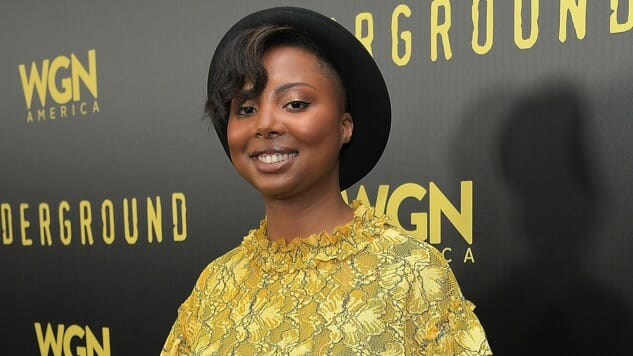The Misha Green Movement: The Underground Showrunner Talks Season Two, That Wild Finale and the Future of the Series
Getty Images
Misha Green, co-creator and co-showrunner (alongside her partner Joe Pokaski) of WGN’s Underground, has achieved nothing short of a miracle with the hit show. The success of her series, which concluded its second season Wednesday night, might come down to a balance between commitment to socially and historically responsible storytelling, and an imaginative, almost reckless abandon, resulting in wildly entertaining drama. Few shows have been able to walk this tightrope, but Green has proven that an inspiring story, focused on enslaved black Americans, does not have to preach respectability, center white saviors, or feel like a torturous, depressing affair that audiences sit through because they know it’s important.
Whether she planned to or not, I suspect that Green has started a movement for those politically and socially-minded creatives looking for proof that—with the right material and the right presentation—love stories, sex, spectacular violence, superheroes and drama can all exist in the same space as a movement committed to black lives. And in such a movement—one inspired by the stories on Underground—there’d be space for countless voices and perspectives, so long as an uncompromising freedom was the goal. For ideas on how such a movement might work, we need only look to Season Two’s storyline.
“What’s so interesting about this season,” Green tells Paste, “and really what’s interesting about exploring the citizen versus the soldier—is that the movement wasn’t a monolith.”
One of the most fascinating aspects of the series has been its exploration of the varying and competing ideologies that can make up a single movement, like the abolitionist movement. Season Two spends a good deal of time up North, where Rosalee (Jurnee Smollett-Bell) has managed to escape and is now working under the tutelage of the great Harriet Tubman (Aisha Hinds). Elizabeth (Jessica De Gouw) has joined a sewing circle of women abolitionists led by Georgia (Jasika Nicole), but these women are not always in agreement when it comes to the big picture of abolishing slavery, and the kinds of risks that are worth taking.
Green says that it was so important to her that the series reflect those who believed in violent rebellion, those who stood for nonviolent protest and resistance, and those who fought back with a belief in God as one of their most precious weapons.
“I’m not a very religious person,” Green says. “And trying to step into Harriet’s shoes—the way she believed in [God]—it was very interesting.” There’s a great scene in which two of our heroes, Harriet and Noah (Aldis Hodge), discuss their stances on the existence of God. For Noah, it’s a myth he’d like to believe in, but after everything he’s experienced, trying to escape and live as the free man he knows he’s always been, God is just an idea. Harriet, however, insists that the fire burning in him—that part of him that knew, even under slavery, that he was free—is, in fact, God himself. It’s as powerful a message as the ones we get from John Brown’s crew, and the women of the sewing circle, and Green admits that over the course of working on the season, even some of her own thoughts on the most impactful forms of resistance shifted a bit.
She was also, as was clear in Season One, incredibly interested in the characters’ varying methods of survival. Ernestine (Amirah Vann) offered up a powerful opportunity to explore the life of a woman living under slavery and attempting to use both her body and her intellect to gain some type of agency.
“With Ernestine, her sexuality is so much a part of her character,” Green says. “This season we were moving to this new place, and Ernestine is the most free she’s technically ever been, and also in the worst place because her religion—which is her children—is gone.”
Ernestine’s new life on a rice plantation with the Gullah Geechee people is, at first glance, completely different from her life living in master Tom Macon’s house on a cotton plantation. But Green wanted to explore the kinds of cycles we often commit to without being aware of it. She compares Ernestine’s abusive lover in Season Two to her relationship with the master in Season One.
“Tom was also abusive, but this time Stine sees that she’s in the same cycle, the same type of relationship.”
Of course, that realization is complicated by the fact that Stine still only knows one way of getting control over her life. The introduction of Clara (DeWanda Wise, also known as the new Nola Darling) was one of the highlights of the season, and Green was thrilled to have her join the cast.
-

-

-

-

-

-

-

-

-

-

-

-

-

-

-

-

-

-

-

-

-

-

-

-

-

-

-

-

-

-

-

-

-

-

-

-

-

-

-

-








































